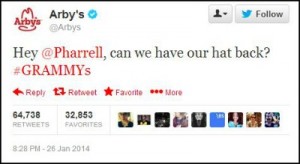Tips and advice on using social media are abundant. The quantity of information is plentiful because the number of people describing themselves as social media experts is also plentiful. In case you need a social media expert, you can find more than 7,700 of them (OK- us) on LinkedIn alone. A sampling of articles and posts related to social media reflects the depth of knowledge being offered up:
“How to become a social media guru in 20 steps” via @arnoldtijernia
“14 tools to create engaging infographics & images for your social media posts” via @bellebcooper
“21 steps to create an awesome LinkedIn profile” via @JeffBullas
So much wisdom is available that the challenge becomes how to filter it so that we process the most relevant advice and not be overwhelmed by the sheer volume of content. To be awesome on social media, you need not master 14 tools, 21 steps, or any other lengthy list. No, you only need to do one thing effectively: Listen.
Give in Order to Get
One obstacle many people have to using social media effectively is that they have a sort of writer’s block- they don’t know what to say. A friend of mine once remarked “social media is easy when you have something to say.” But, it’s that something to say that keeps many people and brands from building an audience. We lose perspective sometimes that social media is at its core a communication channel, a connector of people. Fundamental communication principles can be applied to social media interactions. One of the most useful concepts is a principle espoused by Dale Carnegie. His classic book How to Win Friends and Influence People, first published in 1936, places a premium on listening, understanding, and valuing the other person in a communication interaction. When it comes to social media communication, follow Carnegie’s advice and strive to make others the focus of your conversations.
One way to follow through on putting others first is to be mindful of your “giving to getting” ratio. Experts differ in the exact proportions of messages that talk about others versus talking about yourself, but what if you set a goal that four out of every five messages you post or share on a social networking site was about something or someone else? How close is that ratio to your current practices? When talking about “giving” messages, content could consist of giving attention, praise, or assistance to customers, communities, or friends.In contrast, “getting” messages would be focused inward on ourselves (brand, company, products, or individual employees). Just as Dale Carnegie suggests we become more interesting when we treat others as interesting, social media communication can be more engaging when perceived as conveying interest about the world around us rather than just interest about ourselves.
Live in the Moment
Poor listening skills inhibit effective communication. Why? We must first listen before being able to contribute meaningfully to conversations. One way to become a better listener is to allow yourself to live in the moment. Experience the world around you- What is happening? What are others talking about? What do people find interesting? A recent example that garnered much publicity in the business press was a tweet from Arby’s during the Grammy awards show on January 26. A distinctive hat worn by Pharrell Williams had remarkable similarity to the silhouette of the hat appearing in the Arby’s logo, prompting the following tweet from Arby’s:
This lone tweet has been retweeted more than 83,000 times and favorited over 49,000 times. What is most striking about this tweet is that it was completely spontaneous. Arby’s did not have a social media war room set up during the Grammys waiting for the perfect moment to strike. Instead, this tweet came about because Arby’s social media manager, Josh Martin, was living in the moment. He was not the only person tweeting about the Grammys or Pharrell’s hat. He merely joined in the conversation surrounding an event that attracted the interest of millions that evening. The other noteworthy point about Arby’s hat tweet was that the unscripted nature of the tweet meant it did not run through a legal team for approval. Employees must be trusted to balance living in the moment with protecting brand interests.
Listen Up
I am with the majority- my listening skills need work. Becoming a better listener will make you (and me) a more effective communicator regardless of the channel or context. And, I need to more consistently embrace the joys of living in the moment. Thank you, Dale Carnegie- perhaps the world’s only social media expert who never had the opportunity to participate.


